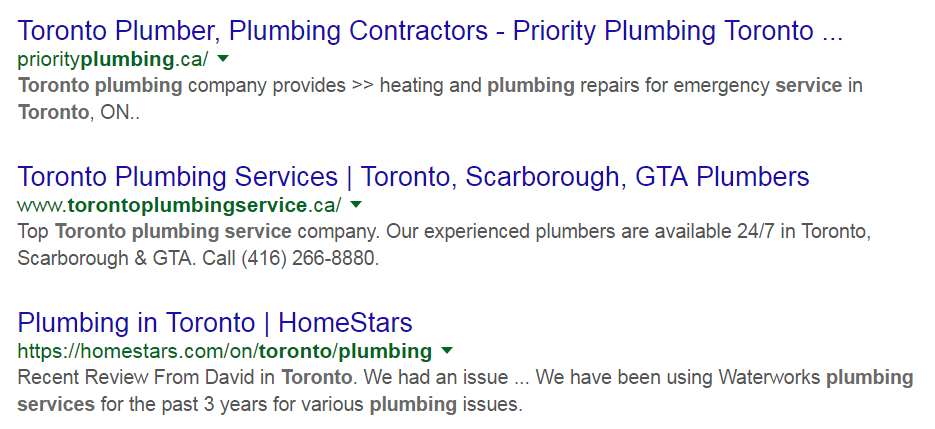Choosing a domain name for your business can be tough. While most people naturally try to secure their business name, there’s value in understanding the role that keywords play in your domain name strategy. What if your business name is relatively generic or if it is already registered? Consider adding keywords to your domain —it could help your website’s performance in a search.
Domain names and SEO
Billions of Internet searches are performed every day. These searches are made up of a variety of keywords, which are the driving force behind what Google, and other search engines, decide to present in a result. When creating your domain name, think about the keywords that your target audience will use when searching for your brand, product, or service. By aligning your domain name strategy with your audience’s search intent, you not only have a better chance of getting found, but you increase the likelihood that they will actually click through on your search result.
Strategically, adding keywords to your domain name can potentially have two main SEO benefits:
-
Higher rankings
According to Moz, an industry-leading SEO software firm, a well-chosen, keyword-rich domain can have positive implications on your ranking, as search engines treat domains as one of their many ranking factors. It’s important to note choosing a keyword-rich domain alone won’t improve your rankings, but rather it is just one piece of an integrated, well-executed SEO strategy.
-
Increased click-through rate
When a user performs a search in Google, the keywords that they’ve used are bolded in the results. For example, if we do a Google search for “Toronto Plumbing Service”, we can see that each of those keywords are bolded in the domains and meta descriptions in the result.

By bolding these terms, Google is essentially highlighting the relevancy of these results to the searchers query, which often leads to more clicks in a search result. In turn, more clicks can ultimately help your site rank better for those keywords (given that you have a high-quality site that delivers on the needs of your visitors).
A recent study performed by Verisign showed that domains with keywords matching a search query received more clicks than those that didn’t. The study looked at the click-through rates of the top 20 search results for 11 million search queries. While results that had no matching keywords in the second-level domain averaged a 12.44% click-through rate, those with one matching term were clicked 21.79% of the time, and those with two or more matching keywords saw a 25.3% click-through rate.
What kinds of keywords should I use in my domain name?
First and foremost, be sure to include your business or brand name. This is the most important thing. Beyond that, here are some smart keyword categories you could include:
Locations
Having a .CA domain name is a strong indicator to users that you are based in Canada. But it’s also possible to refine your location even more. Is your business/organization based in a particular city, neighborhood, or street? Many searchers who are looking for a particular product or service will use location keywords to refine their search. As we saw in the example above, it’s far more likely that a consumer will search for “Toronto plumbing service” rather than just “plumbing service” or “plumbing”. Searchers today are smart enough to add more keywords into their searches to find better results for them.
Products or Services
Along with using location keywords, searchers often include the specific type of product or service that they are looking for. For example, let’s say Reggie owns a pizza parlour. For him, the domain name ReggiesPizza.ca would be a good choice as it includes both his business name (Reggie’s) and his product (pizza). Furthermore, if he was located in Vancouver, he should also consider registering ReggiesPizzaVancouver.ca. This domain name not only helps him protect his brand, but also helps searchers understand that Reggie sells pizza in Vancouver.
How many keywords should I include?
While the study may imply that more keywords in a domain will help you perform better in a search, this is not always entirely true. Domain name best practices state that shorter, more memorable domain names are typically best. If you want to take advantage of adding keywords to your domain name, consider including one or two keywords to set yourself apart and make your domain more relevant to the user. Relying on a longer, exact match domain (a domain that is exactly the same as a search phrase you are targeting) without having a quality website or content is no longer as beneficial as it once was – so tread carefully. An example of this would be registering the domain name BestPersonalTrainingGymMontreal.ca in an attempt to capture searches for that exact phrase. This article nicely explains the implications of an exact match domain (especially on a low quality website), and goes into details on the pros and cons.
The bottom line is that including some keywords in your domain name in addition to your brand name can have a positive impact on your ranking for particular queries and can help improve your click through rate in a search result. Keep in mind that this is only one of many strategies that can affect your website’s SEO, and this alone will not help you perform well in a search.
A quote from the first Moz article we cited in this post sums it up best:
“Ideally, webmasters should strike a balance between finding a catchy, unique, brand-friendly domain name and having a domain that contains keywords they are trying to target.”
It’s all about balance.
Tips for including keywords in your domain name
Here are some quick tips to keep in mind when choosing a domain name with keywords:
- Always try to include your business or brand name in your domain name
- Consider adding one or two additional keywords that you are targeting
- Domain names should be short, catchy and memorable
- Long exact match domain names are not as effective as they once were
- A keyword rich domain alone is not an SEO strategy, but it can be beneficial as a part of your overall, integrated SEO strategy
Now that you know the tips and tricks behind choosing a good domain name, learn how to buy your .CA domain name today!





